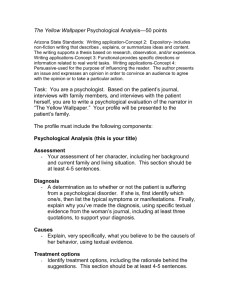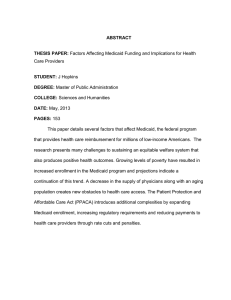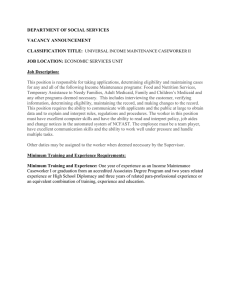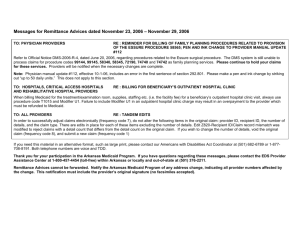Page 1 of 2
advertisement
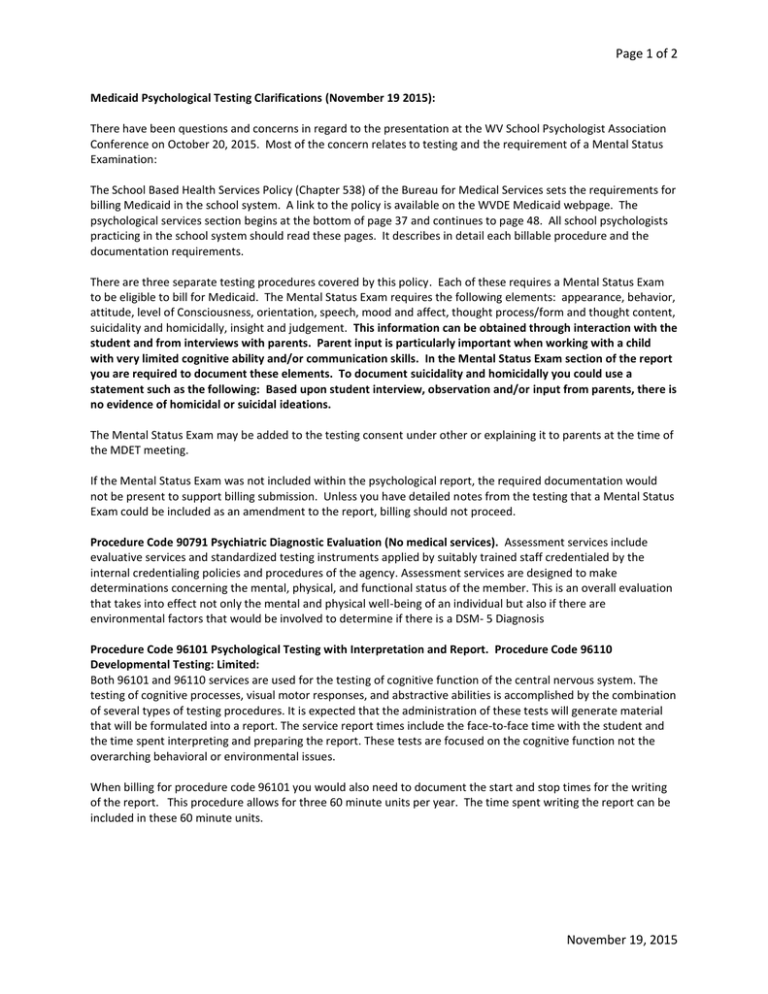
Page 1 of 2 Medicaid Psychological Testing Clarifications (November 19 2015): There have been questions and concerns in regard to the presentation at the WV School Psychologist Association Conference on October 20, 2015. Most of the concern relates to testing and the requirement of a Mental Status Examination: The School Based Health Services Policy (Chapter 538) of the Bureau for Medical Services sets the requirements for billing Medicaid in the school system. A link to the policy is available on the WVDE Medicaid webpage. The psychological services section begins at the bottom of page 37 and continues to page 48. All school psychologists practicing in the school system should read these pages. It describes in detail each billable procedure and the documentation requirements. There are three separate testing procedures covered by this policy. Each of these requires a Mental Status Exam to be eligible to bill for Medicaid. The Mental Status Exam requires the following elements: appearance, behavior, attitude, level of Consciousness, orientation, speech, mood and affect, thought process/form and thought content, suicidality and homicidally, insight and judgement. This information can be obtained through interaction with the student and from interviews with parents. Parent input is particularly important when working with a child with very limited cognitive ability and/or communication skills. In the Mental Status Exam section of the report you are required to document these elements. To document suicidality and homicidally you could use a statement such as the following: Based upon student interview, observation and/or input from parents, there is no evidence of homicidal or suicidal ideations. The Mental Status Exam may be added to the testing consent under other or explaining it to parents at the time of the MDET meeting. If the Mental Status Exam was not included within the psychological report, the required documentation would not be present to support billing submission. Unless you have detailed notes from the testing that a Mental Status Exam could be included as an amendment to the report, billing should not proceed. Procedure Code 90791 Psychiatric Diagnostic Evaluation (No medical services). Assessment services include evaluative services and standardized testing instruments applied by suitably trained staff credentialed by the internal credentialing policies and procedures of the agency. Assessment services are designed to make determinations concerning the mental, physical, and functional status of the member. This is an overall evaluation that takes into effect not only the mental and physical well-being of an individual but also if there are environmental factors that would be involved to determine if there is a DSM- 5 Diagnosis Procedure Code 96101 Psychological Testing with Interpretation and Report. Procedure Code 96110 Developmental Testing: Limited: Both 96101 and 96110 services are used for the testing of cognitive function of the central nervous system. The testing of cognitive processes, visual motor responses, and abstractive abilities is accomplished by the combination of several types of testing procedures. It is expected that the administration of these tests will generate material that will be formulated into a report. The service report times include the face-to-face time with the student and the time spent interpreting and preparing the report. These tests are focused on the cognitive function not the overarching behavioral or environmental issues. When billing for procedure code 96101 you would also need to document the start and stop times for the writing of the report. This procedure allows for three 60 minute units per year. The time spent writing the report can be included in these 60 minute units. November 19, 2015 Page 2 of 2 Reimbursement rates for the three testing procedures are: 90791 $91.42 96101 $57.53 96110 $33.37 If there is a doctor’s diagnosis available you may include this in your report citing the source. Psychologists are required to provide a diagnosis or statement in regard to lack of a diagnosis in your report based on your assessment and any other information available to you at the time of the report. The diagnosis codes you assign are not dependent upon an eligibility finding from an Eligibility Committee (EC) meeting. The following are clarifications sent to county special education directors at the beginning of September: A student has to have an active IEP to bill for any Medicaid services. As a result Psychological Testing cannot be billed for students going through an initial evaluation. Psychological testing for a re-evaluation or an additional assessment request for a student with an active IEP can be billed. This includes students with a Medicaid number who don’t have any direct billable services. (Example: A student who is Specific Learning Disabled without any billable services, can still be eligible for psychological testing for the student’s re-evaluation). The “Re-Evaluation Determination Plan” form can function as a type of service care plan for testing services. Procedure 96101 (Psychological Testing with Interpretation and Report) allows for three (60 minute units) for conducting assessments and writing the reports. Example: School psychologist tests a student for two hours and spends one hour writing the report. That would be billable for three units. You would need to document the start/stop times for the actual testing and the start/stop times for writing the report. (Caution: Time spent using a computer scoring system is not billable. Time spent interpreting those results and report writing is still billable.) Psychological testing services require a completed report within 20 calendar days. The timeline starts with the first day of testing and ends on the date of the completed report. The Eligibility Committee (EC) meeting is not a factor in the 20 calendar day window. Billing for psychological testing is not dependent upon an Eligibility Committee (EC) meeting. The Medicaid billing is for the testing service not for the Eligibility Committee (EC) meeting. Interns cannot bill for Medicaid services. November 19, 2015

